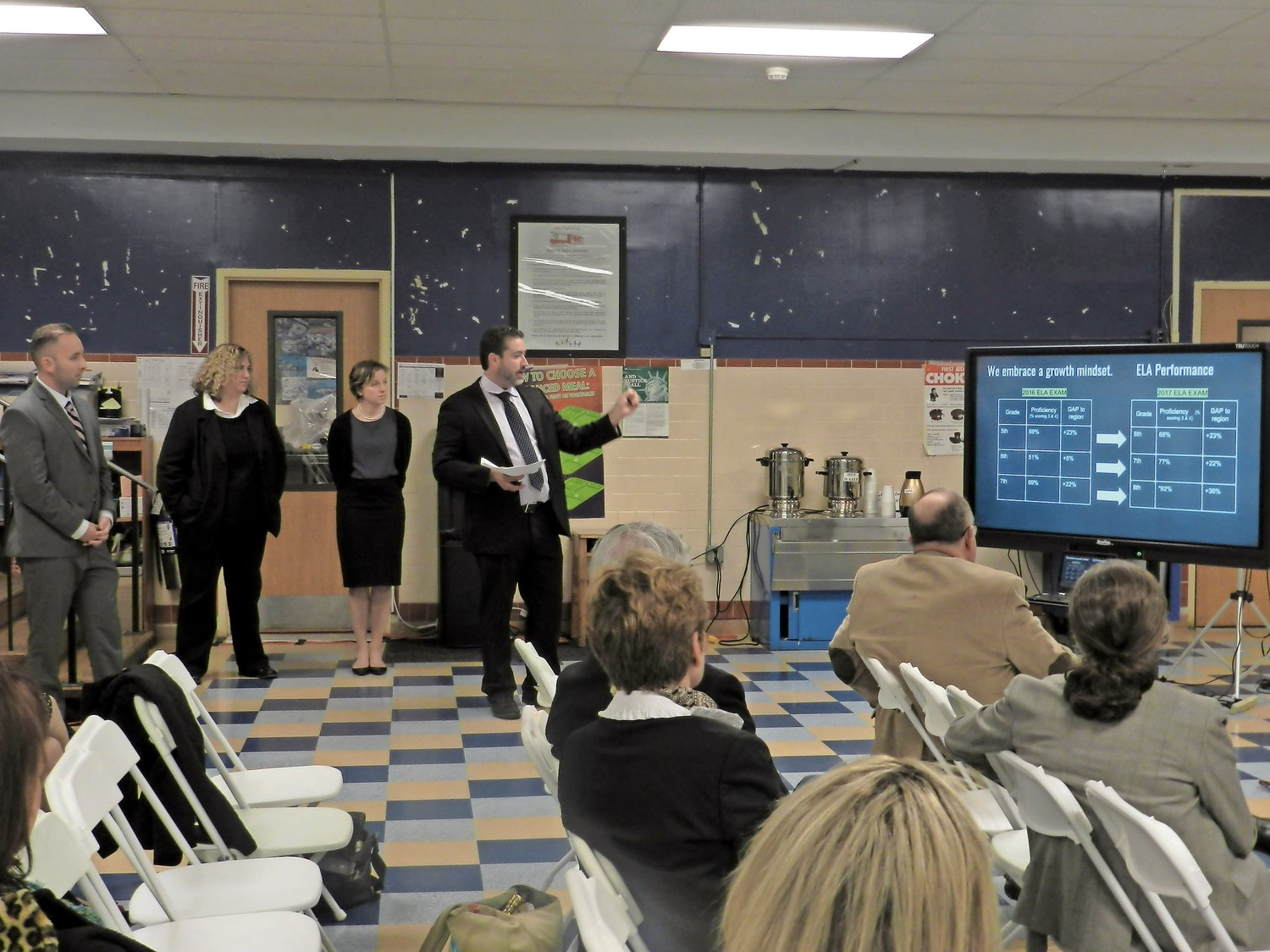Educators from the middle school share student achievement report
Following the North Shore elementary schools’ presentation on student achievement, a team of educators from North Shore Middle School presented their report to the board of education last Thursday night.
Principal Robert Dennis said the report was created by taking a broader look at the curriculum, and assessing student performance, not only from standardized tests and regent exam scores, but also through North Shore’s shared valued outcomes initiative and school projects. “These lessons are evident of the thinking and hands-on opportunities our students have each day,” he said.
He described the practice of accountable talk, which is intended to deepen the thinking and conversations between students and their peers, leading to richer academic discussions. Dennis said that this practice helps extend students’ thinking beyond the classroom.
“We stress the importance of tying what we do in the classroom to contexts in the real world,” he explained.
Seth Gordon, the middle school’s humanities teacher leader, outlined student performance on ELA examinations. The graphs indicated an improvement in mastery and proficiency rates across all grade levels between 2015 and 2017. Gordon said these rates are the highest they’ve been since the introduction of the Common Core. The eight-grade, he said, clocked in a 92 percent proficiency rating this year, one of the highest of any middle school on Long Island.
“This shines a light on some of the work that we’re doing,” Gordon said. “The teachers and their practices are improving, and the students are performing better as well.”
The improvement of students’ scores on these exams also took into account North Shore’s gap to regional performance rate, which is 22 percent higher than last year, according to Gordon. The gap to region statistic measures what percentage of North Shore students are performing above the county average.
Gordon outlined some of the efforts the school took in order to achieve these improved ratings. “We’ve used the ELA test data to inform our instruction, targeted and tailored support for certain students, and developed collaborative teacher teams to address literacy concerns,” he said.
He added that providing high quality, professional development of curriculum work is crucial to maintain this level of achievement at the middle school level. “It’s a ‘work smarter, not harder’ philosophy,” he said. “We’re doing work in a more natural way rather than going through more preparations.”
Amy DiMeola, the teacher leader of math and sciences, broke down the steps taken in order to ensure students’ continual and future growth in mathematic achievement.
“There’s been a considerable growth in proficiency and mastery rates on New York State math tests between 2016 and 2017,” DiMeola said. “We’ve identified both individual and cohort struggles to tailor our teaching.”
For example, the math department worked to overhaul one unit of the Algebra course to address quadratic functions using a conceptual approach to get a deeper understanding of how they behave. DiMeola said this resulted in gains in student performance and laid the groundwork for them to have a stronger foundation in their studies going forward.
She added that the school’s new approach to living environment learning has improved student engagement in the classroom. “They’re acting as scientists, doing the experiments, instead of just passively receiving the information,” she said.
After the presentation, Trustees David Ludmar and Marianne Russo questioned the significant opt out rates on testing, and said it should be taken into consideration when concluding advancements in achievement.
“It’s encouraging to see that we’re teaching students the skills required to do well on the test, but we need to convey to the parents what we’re using the [results] for,” Russo said.
The school is developing a way in which to communicate to parents exactly how it uses that information, Dennis said.
“It’s interesting to see how test scores have changed since the Common Core has been implemented,” said Board President Toni Labbate. “I’m happy that to see authentic learning is happening everywhere.”






